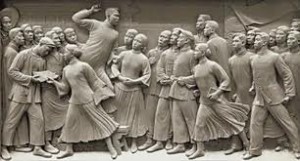Posted: May 9th, 2012 | No Comments »
I wind up the first phase of my US tour this week (I’ll be back in June!!) in San Fancisco. I’ll be at Book Passage in the San Francisco suburb of Corte Madera this week…More details here


Posted: May 9th, 2012 | No Comments »
This new book, Performing China, sounds interesting….and I know China Rhyming has readers who like these “Chinois studies” (not sure such a thing exists exactly!), as do I. This is early and so a little out of my core knowledge area!

China in the seventeenth and eighteenth centuries was a model of economic and political strength, viewed by many as the greatest empire in the world. While the importance of China to eighteenth-century English consumer culture is well documented, less so is its influence on English values. Through a careful study of the literature, drama, philosophy, and material culture of the period, this book articulates how Chinese culture influenced English ideas about virtue.
Discourses of virtue were significantly shaped by the intensified trade with the East Indies. Chi-ming Yang focuses on key forms of virtue—heroism, sincerity, piety, moderation, sensibility, and patriotism—whose meanings and social importance developed in the changing economic climate of the period. She highlights the ways in which English understandings of Eastern values transformed these morals.
The book is organized by type of performance—theatrical, ethnographic, and literary—and by performances of gender, identity fraud, and religious conversion. In her analysis of these works, Yang brings to light surprising connections between figures as disparate as Confucius and a Chinese Amazon and between cultural norms as far removed as Hindu reincarnation and London coffeehouse culture.
Part of a new wave of cross-disciplinary scholarship, where Chinese studies meets the British eighteenth century, this novel work will appeal to scholars in a number of fields, including performance studies, East Asian studies, British literature, cultural history, gender studies, and postcolonial studies.
Chi-ming Yang is an assistant professor of English at the University of Pennsylvania.
Posted: May 8th, 2012 | No Comments »
I’m going to Berkeley (where I’ve never been before – across that great bridge!) on May 9th to Books Inc – any San Francisco folk please pop along…more details here…they’re California’s oldest bookseller apparently!

Posted: May 8th, 2012 | No Comments »
Sorry, but my post on the Beijing May 4th Monument didn’t include a picture of the sculpted representation of a copy of La Jeunesse – somehow I managed to delete the photo!! However, there are of course pictures of surviving copies of the publication which ran from 1915 to 1926 (and was pro-Communist Party from 1920).

Posted: May 7th, 2012 | No Comments »
I’ve walked past the rather uninspriring May 4th Movement memorial on Beiheyan Dajie in Peking quite a few times and not paid it that much attention to be honest. fortunately I don’t need to recount the history of May 4th 1919 to readers of this blog. But I did note recently that there are some covers of La Jeunesse included in the sculpture which is quite interesting. Started in 1915 by Chen Duxiu an early communist and then leader of China’s Trotskyist movement (look hard for that one in the official records!!) it was a genuinely revolutionary journal of the New Culture Movement. Nice to see it remembered in that monument – of course anybody starting up a revolutionary journal now calling for a new start, “youth” and revolution would find themselves looking a prison cell from the inside out pretty quickly – hear that noise?? That’s Chen spinning in his grave!


Posted: May 7th, 2012 | No Comments »
Regular readers of China Rhyming will know that we like anything about opium, references to opium in history and literature as well as opium dens all over the place, particularly in London…
And so here’s this week’s Guardian Books Podcast which has a discussion, among other things, of opium in literature….
And here’s a new book they discuss buy Jeet Thayil called Narcopolis which has references to opium smoking in India as well as Chinois links between opium and China in the Indian imagination.

Posted: May 6th, 2012 | 1 Comment »
On May 7 I’m at the Seattle Asian Art Museum (co-presented with the Gardner Center for Asian Art & Ideas and Elliot Bay Books) doing the Midnight in Peking thing. I’ve long wanted to go to Seattle but have never got there before so obviously I’m excited…










